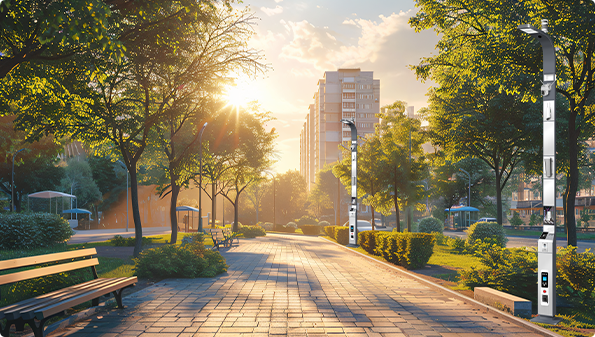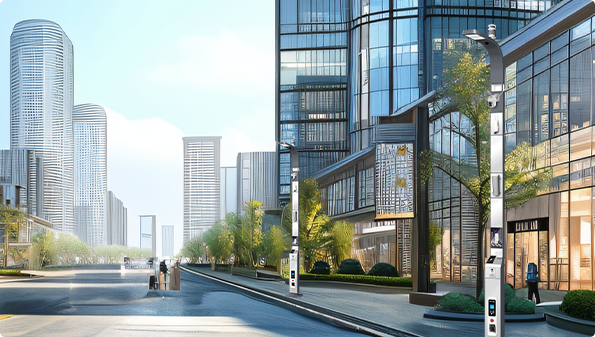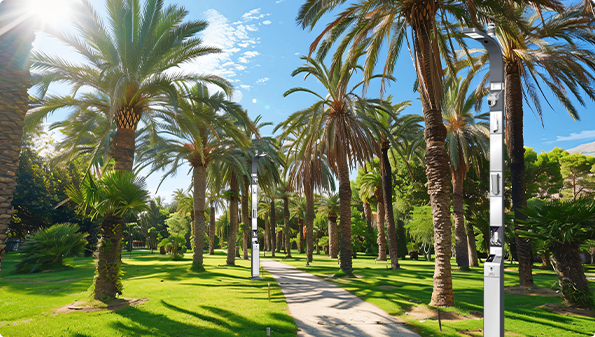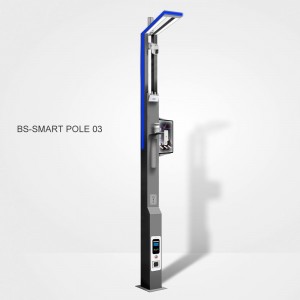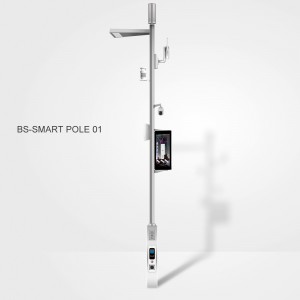Lighting up the way to the intelligent future
Numerous countries are actively implementing favorable policies for importing and utilizing smart poles, driven by their commitments to smart city initiatives and infrastructure modernization. Step by step with the quick science development to mutually build up a smart city.
India: As part of its smart city mission, India has been installing smart poles integrated with energy-efficient LED lights, air quality sensors, Wi-Fi, and EV charging capabilities. For example, smart street lighting and poles have been deployed in cities like New Delhi and smart urban centers like Pimpri-Chinchwad and Rajkot. These projects benefit from government subsidies and public-private partnerships to enhance urban infrastructure
China: The Chinese government has invested heavily in smart city programs, with hundreds of cities adopting smart poles featuring IoT technology, renewable energy integration, and EV charging facilities. This aligns with its broader efforts to improve urban energy efficiency and smart connectivity. Check out the smart street lighting system and get to know more about smart management.
European Union: Europe has backed smart city initiatives through its Horizon Europe program, which includes funding for smart infrastructure such as multifunctional smart poles. These poles are integral to projects aimed at achieving climate neutrality by 2030. Gebosun has released the best-selling modularity smart pole 15 out on the market, gaining lots of compliments after smart pole projects.
United States: Many U.S. cities have embraced smart poles as part of their urban renewal strategies. These poles are equipped with energy-efficient lighting, surveillance cameras, and public Wi-Fi to enhance public safety and connectivity. With the vast territory, smart poles with IoT appear to be particularly important for the connection within the city.
Middle East: These countries are focusing on developing sustainable smart cities. UAE’s Masdar City and Saudi Arabia’s NEOM project showcase smart pole technology to reduce energy use while offering smart services like data collection and public connectivity. Gebosun smart pole is equipped with solar panels and is much more suitable for Middle East areas because of the ample sunlight. Take a look at the solar smart poles.
Advantages of smart poles
1. They are a state-of-the-art solution for modern city infrastructure.
2. They address urban challenges. The following section outlines the key advantages and benefits of incorporating smart poles into city infrastructure.
Multi-functionality: Smart poles offer a single, integrated solution that combines multiple features, including energy-efficient LED lighting, public Wi-Fi, CCTV surveillance, environmental sensors, and EV charging stations. This reduces the need for separate infrastructure for each function, offering a more efficient and cost-effective solution.
Energy efficiency is a key benefit of smart poles. Many smart poles integrate solar panels and energy-saving LED lights, thereby reducing electricity consumption and contributing to sustainable urban development.
Enhanced urban connectivity: 4G/5G technology is integrated into smart poles to enhance internet accessibility, providing residents with seamless connectivity and enabling the use of IoT-enabled devices.
Real-time data collection: Environmental sensors on smart poles provide city authorities with the data they need to make informed decisions and improve urban living conditions, including monitoring air quality, temperature, and noise levels.
Enhanced public safety: Smart poles support a range of features, including surveillance cameras and emergency communication systems, enhancing public safety and assisting law enforcement with real-time monitoring.
Space optimisation: The integration of multiple functionalities into smart poles helps to reduce clutter in urban environments, thereby contributing to cleaner and more organised cityscapes.
The ability to upgrade smart poles with new technologies ensures they remain a future-proof investment, capable of meeting the evolving urban needs of the future. The integration of renewable energy sources with smart poles helps to reduce the carbon footprint and aligns with green energy initiatives.
FAQs about smart poles
What is a smart pole?
A smart pole is a multifunctional infrastructure that integrates features like LED lighting, Wi-Fi, surveillance cameras, environmental sensors, and 5G connectivity to enhance urban infrastructure.
How do smart poles support smart cities?
They enable connectivity, data collection, energy efficiency, public safety, and integration of IoT technologies, contributing to sustainable and efficient urban development.
What features can be integrated into a smart pole?
- Energy-efficient LED lighting
- Public Wi-Fi
- CCTV surveillance cameras
- 5G or telecom modules
- Environmental sensors (air quality, noise levels, etc.)
- EV charging ports
- Digital displays for advertisements
How much maintenance do smart poles require?
Maintenance is minimal due to durable materials and advanced technologies like remote monitoring systems that identify issues in real time.
What is the cost of a smart pole?
Costs vary depending on features, materials, and functions, typically ranging from a few thousand to tens of thousands of dollars per unit.
Post time: Nov-15-2024

